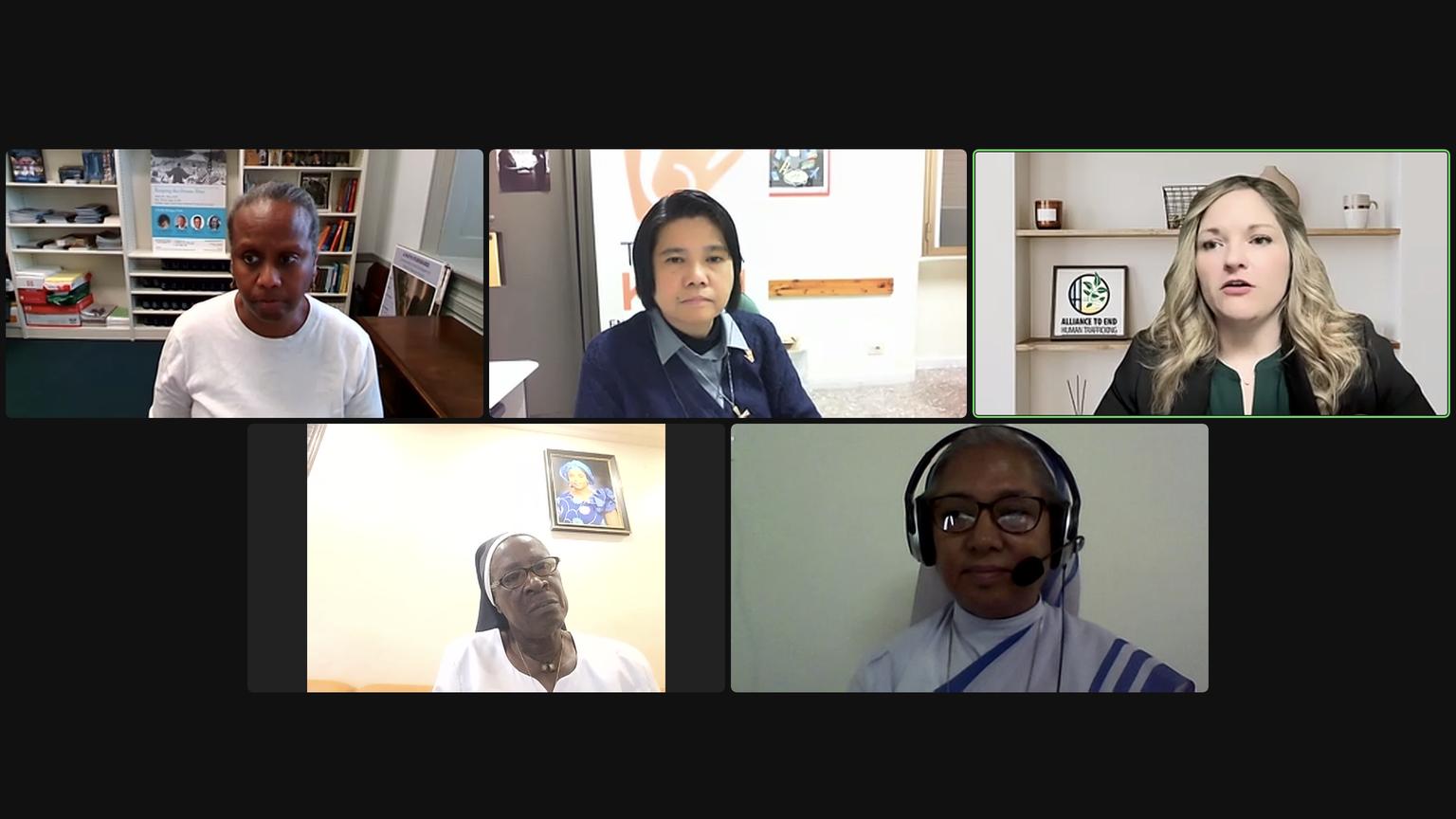
PROSPECT HEIGHTS — There’s a saying in Nigeria, recalls Sister Patricia Ebegbulem, that “if you will act, and I will act, [human] trafficking will end.” It’s a saying she recently invoked as a message to the world that every country, and every person, has a role to play to end the practice.
“I will request that in countries of origin we act and try to prevent trafficking by empowering the vulnerable, the marginalized, whichever way we can,” Sister Patricia said in a March 6 webinar. “And if you’re in a country of transit where the borders are porous, shine your eyes and if you see anybody that is being sneaked or being trafficked, speak and do something.”
“And if you’re in a country of destination please try to stop the demand because if there is no demand then there is no supply,” said Sister Patricia, who runs a shelter for victims of human trafficking in Nigeria.
Answering the same question on how the public can help eradicate human trafficking, Sister Licia Joseph referenced the current digital age and the potential impact of social media campaigns.
“Use social media to conduct an awareness program. Even those who are listening to us right now could also think of making some videos, less than one minute, to make people aware on all forms of social media,” said Sister Licia, a member of the Canon Law Council of the International Union of Superiors General, who has supported ministries to help rescue exploited girls and prosecute traffickers.
“That will spread very fast, and people will become aware of what traffickers are doing,” Sister Licia added, also noting the importance of awareness campaigns in places like schools and religious institutions.
Sister Patricia and Sister Licia both participated in the webinar, “Catholic Sisters Working to Eradicate Human Trafficking” that was put together by the Initiative on Catholic Social Thought and Public Life at Georgetown University.
According to the International Labour Organization, as of 2021 about 27.6 million worldwide were victims of human trafficking, about 17.3 million of which were exploited in the private sector, about 6.3 million of which were in forced commercial sexual exploitation, and about 3.9 million of which were in forced labor imposed by a state.
All of the participants agreed that migrants in transit — often fleeing their home nations in search of a better life due to poverty, as well as climate and political instability — are some of the most vulnerable to human trafficking and exploitation, particularly women and children.
Sister Patricia noted how important it is for migrants to have the correct documentation and a plan for where they are headed because traffickers are “criminally cunning,” and present people promises and offers that look “very, very real and very proper.” This reality is another reason she said people in the countries to which migrants arrive should extend a hand to help the immigrants around them.
“People, when we have migrants or immigrants around us we should have the heart of God and be able to help them settle, to empower them, and not to exploit them or their vulnerability,” Sister Patricia said.
Addressing the link between forced migration and human trafficking is the current focus of the Alliance to End Human Trafficking, an organization founded by American Catholic sisters in 2013 that supports survivors and advocates for the eradication of human trafficking.
The organization’s executive director, Katie Boller Gosewisch, said that the link between the two is clear, and therefore they believe policy from the United States government is crucial. In particular, the organization is advocating for Congress to pass the Frederick Douglass Trafficking Victims Prevention and Protection Reauthorization Act of 2023.
The act passed the House by a 414-11 vote in February. Domestically, the legislation would pave the way for community education programs, enhanced preventative measures, and reintegration programs for survivors. Internationally, the act would create ways to hold nations accountable if they’re not promoting safe environments for their citizens and promote programs to help people thrive in their home country.
The bill would allocate about $1 billion over the next five years to prevent and address human trafficking.
“We are hoping that it will be fast-tracked into the Senate and passed,” Gosewisch said.
“It has stalled in the Senate, but it is crucial to be able to get funding and assistance to people in our country, but also to people in countries where we see a large number of migrants,” Gosewisch continued. “We want to be able to empower people to stay in their homes.”
Beyond legislative efforts, Gosewisch touted the importance of education across all aspects of society. Simply, she also highlighted the importance of adhering to the phrase “see something, say something.”
“I think people are hesitant to want to approach law enforcement or nonprofit organizations that can maybe help because they’re worried about maybe getting it wrong, and I would say for that, you might get it wrong, that’s a possibility. But on the other side you might get it right and that’s the difference between life or death,” Gosewisch said.
